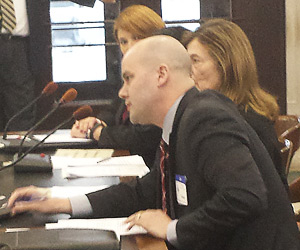
On Monday, Feb. 9, legislation that would overturn the superintendent salary cap was released by the Senate Budget and Appropriations Committee. S-1987 would explicitly prohibit the New Jersey Department of Education (NJDOE) from regulating the maximum salary amount that a school district may pay its superintendent of schools.
The NJSBA fully supports the proposed legislation. Jonathan Pushman, NJSBA legislative advocate, testified in support of the legislation. The testimony cited the Association’s official policy and belief that the “hiring of the chief school administrator is one of the most critical board responsibilities and that the authority to select the most appropriate and suitable candidate should continue to rest with the board of education.” The superintendent salary cap infringes on this responsibility by constraining a board’s ability to recruit and retain a highly qualified administrator.
Pushman characterized the limitation on superintendent compensation as a “cap within a cap” that has been rendered unnecessary due to other existing controls on school district spending. Such controls include the two-percent property tax levy cap, the administrative spending growth limits, and the accountability regulations that require executive county superintendents to review all superintendent contracts. In light of these constraints that effectively limit the growth of government spending, the NJSBA believes that districts must maintain the flexibility to direct their limited resources in a manner that best meets the needs of students while remaining accountable to parents, taxpayers and voters.
NJSBA’s testimony also noted that the superintendent salary cap has resulted in increased turnover at the superintendent position, which diminishes continuity of instruction and creates instability within a district. As highly qualified superintendents resign or retire, the level of experience among the pool of candidates to fill a vacancy has also declined due to the salary cap. And since no other position is subject to a maximum salary amount, the cap deters the state’s educational leaders from pursuing the superintendency as they can earn nearly as much, and sometimes more, money by continuing to serve as a principal or in some other capacity.
Joining the NJSBA in support of the legislation were representatives of the New Jersey Principals and Supervisors Association, the New Jersey Association of School Administrators, the Garden State Coalition of Schools, and the New Jersey Charter School Association.
Several individual board of education members also submitted written testimony and urged the committee to move the bill forward. Dr. Karen Cortellino, president of the Montville Board of Education, described the situation in her district where the current superintendent, Dr. Paul Fried, will be resigning at the end of the school year to take a position in Westchester County, New York. Dr. Cortellino argued that “turnover at the superintendent’s level creates loss of stability and educational continuity. Now, in Montville, all the momentum and goodwill built by Dr. Fried simply stops.” She added, “Leadership matters. The volume and complexity of new initiatives, mandates, and regulations coming out of Trenton makes experienced, competent leadership more important than ever. We should be allowed to attract, and keep, the best talent out there.”
Michele Lenhard, who sits on the Ridgewood Board of Education, also advocated for repeal of the cap. In her written testimony, Lenhard stated that the capping of superintendent salaries “has been the single most damaging decision made by the state of New Jersey which impacts public education. The instability in school district leadership created statewide by the salary caps threatens the strength of public education in this state.” Lenhard also described how the salary interferes with local control: “The vast majority of school boards in New Jersey are democratically-elected. They are entrusted by the taxpayers to spend tax dollars judiciously. If they fail to do so, the voters are empowered to replace them through the electoral process. This decision is best left at the local level.”
The budget committee passed the measure by a vote of 8-2, and it may now be posted for a floor vote by the full Senate. Local boards of education can demonstrate their support for S-1987 and its Assembly counterpart (A-2930) by adopting the sample resolution drafted by the NJSBA. Upon adoption, the resolution should be sent to your local legislative delegation, the Speaker of the General Assembly, the President of the state Senate, the Governor, and the chairs of the Assembly and Senate Education Committees. A copy should also be forwarded to the NJSBA headquarters either electronically or by mail. To date, nearly 80 local boards of education have adopted the resolution.
Any questions on this legislation may be directed to Jonathan Pushman in the NJSBA’s governmental relations department.
